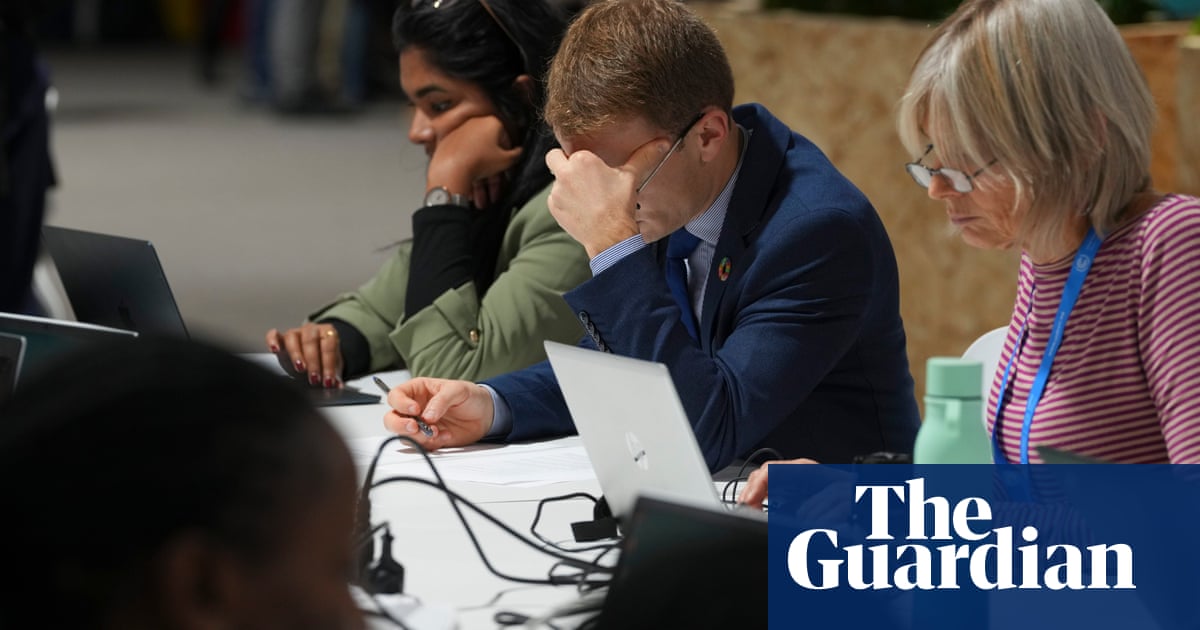Developing countries have reacted angrily to an offer of $250bn a year in finance from the rich world – considerably less than they are demanding – to help them tackle the climate crisis.
The offer was contained in the draft text of an agreement published on Friday afternoon at the Cop29 climate summit in Azerbaijan, where talks are likely to carry on past a 6pm deadline.
Juan Carlos Monterrey Gómez, Panama’s climate envoy, told the Guardian: “This is definitely not enough. What we need is at least $5tn a year, but what we have asked for is just $1.3tn. That is 1% of global GDP. That should not be too much when you’re talking about saving the planet we all live on.”
He said $250bn divided among all the developing countries in need amounted to very little. “It comes to nothing when you split it. We have bills in the billions to pay after droughts and flooding. What the heck will $250bn do? It won’t put us on a path to 1.5C. More like 3C.”
According to the new text of a deal, developing countries would receive a total of at least $1.3tn a year in climate finance by 2035, which is in line with the demands most submitted before this two-week conference. That would be made up of the $250bn from developed countries, plus other sources of finance including private investment.
Poor nations wanted much more of the headline finance to come directly from rich countries, preferably in the form of grants rather than loans.
Civil society groups criticised the offer, variously describing it as “a joke”, “an embarrassment”, “an insult”, and the global north “playing poker with people’s lives”.
Mohamed Adow, a co-founder of Power Shift Africa, a thinktank, said: “Our expectations were low, but this is a slap in the face. No developing country will fall for this. It’s not clear what kind of trick the presidency is trying to pull. They’ve already disappointed everyone, but they have now angered and offended the developing world.”
The $250bn figure is significantly lower than the $300bn-a-year offer that the Guardian understands some developed countries were considering at the talks.
The offer from developed countries, funded from their national budgets and overseas aid, is supposed to form the inner core of a “layered” finance settlement, accompanied by a middle layer of new forms of finance such as new taxes on fossil fuels and high-carbon activities, carbon trading and “innovative” forms of finance; and an outermost layer of investment from the private sector, into projects such as solar and windfarms.
These layers would add up to $1.3tn a year, which is the amount that economists have calculated is needed in external finance for developing countries to tackle the climate crisis. Many activists have demanded more: figures of $5tn or $7tn a year have been put forward by some groups, based on the historical responsibilities of developed countries for causing the climate crisis.
after newsletter promotion
This latest text is the second from an increasingly embattled Cop presidency. Azerbaijan was widely criticised for its first draft on Thursday.
There will now be further negotiations among countries and possibly a new or several new iterations of this draft text.
Avinash Persaud, a former adviser to the Barbados prime minister, Mia Mottley, and now an adviser to the president of the Inter-American Development Bank, said: “There is no deal to come out of Baku that will not leave a bad taste in everyone’s mouth, but we are within sight of a landing zone for the first time all year.”

